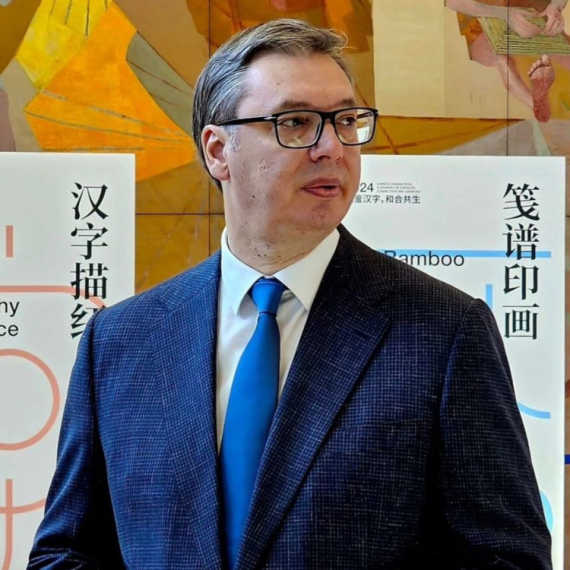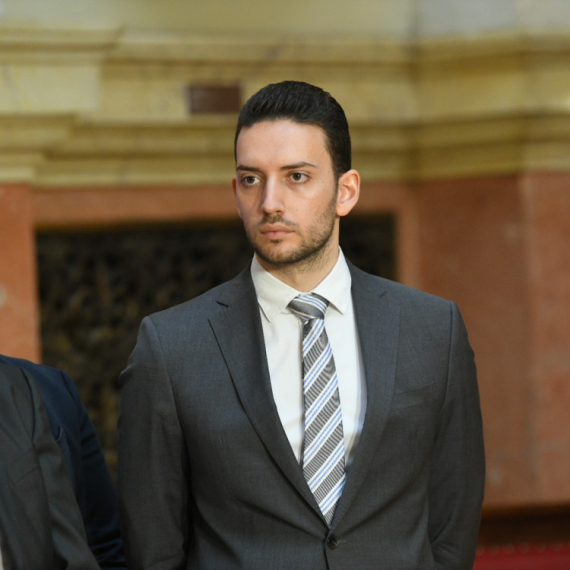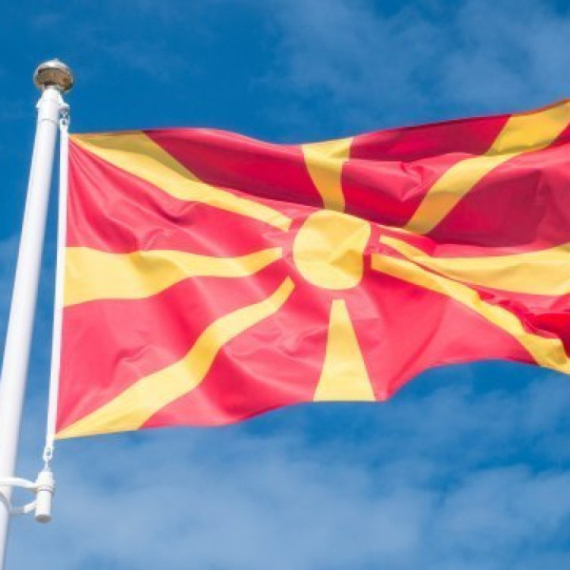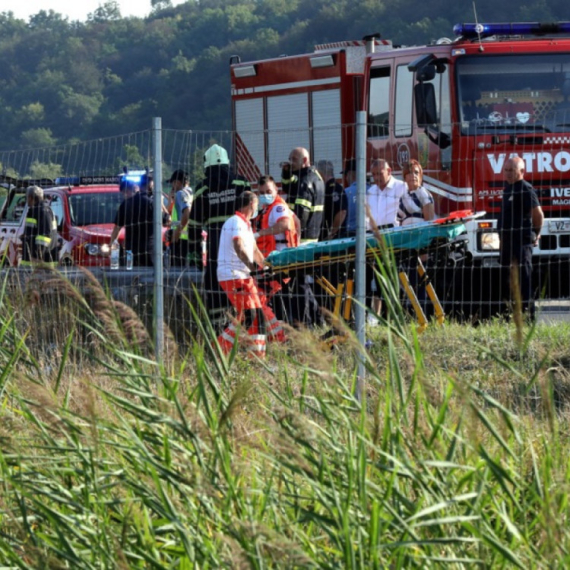EC: Institutions need strengthening
Josep Lloveras says that Belgrade must close the Hague question in order to accelerate necessary reforms.
Thursday, 08.11.2007.
09:15

Josep Lloveras says that Belgrade must close the Hague question in order to accelerate necessary reforms. “There are institutions in various spheres, for example public purchasing let’s say, that need to be strengthened. I’ve mentioned the Constitutional Court, that’s essential, the fundamental institutions,” said the head of the European Commission (EC) delegation to Serbia. EC: Institutions need strengthening “There are also institutions on paper that don’t function – take, state auditing, that needs to start working. There’s a long list of institutions and things that need to be applied,” said Lloveras. Yesterday EU officials, during initialing of the Stabilization and Association Agreement (SAA) with Serbia in Brussels, reiterated that final signing of the agreement depended on full Hague cooperation, in the form of the arrest of Ratko Mladic. Were Mladic to be caught by the end of the year, Serbia could sign the SAA as early as the beginning of 2008. That way, it would join Croatia, Macedonia, Albania and Montenegro in the final phase of EU membership negotiations. EU Enlargement Commissioner Olli Rehn said Wednesday at the initialing of the SAA with Serbia that this was Serbia's first concrete step toward integration into the EU, Beta news agency reported from Brussels. He commended the Serbian negotiating team for its "extraordinary negotiating capability - proof of the (Serbian) state administration's powerful capacity," adding that Serbia could quickly implement the SAA and make leaps on the road of European integration. Rehn also praised Serbia's progress in meeting the political conditions for European integration, saying he believed this would also lead to signing the SAA with the EU. "With reforms, this will boost the growth of the Serbian economy and help Serbia move forward by building a functional market economy," the commissioner said. President Boris Tadic said the agreement was a great reward for the pro-European Serbia, which proved that Serbia had the capacity to become a full member of the EU. Tadic went on to say that "this presages a better standard of living for citizens, greater development and modernization possibilities for our country, a higher level of security, and peace." "If we also add more certainty of foreign investment, the creation of new jobs, traveling without visas and passports, then I am absolutely sure that the Serbian citizens will always support the achievement of our strategic goal - EU membership," Tadic said. According to him, all war crimes indictees in the former Yugoslavia must answer for their deeds, because there can be neither reconciliation in the Balkans nor the region's full integration into Europe without facing the past and armed conflicts. The president voiced hope that the SAA would also be signed in a few weeks' time, and offered assurances that Serbia would fully cooperate with the Hague tribunal. He said that some fugitives from the Hague tribunal may not be in Serbia, but added that Ratko Mladic would be arrested and extradited to The Hague if he turned out to be in Serbia. Deputy Prime Minister Bozidar Djelic, who initialed the agreement on behalf of Serbia, said afterwards that Serbia's future in Europe can now be seen more clearly, and added that he believed Serbia could win candidate status by the end of 2008. Djelic, who headed the Serbian negotiating team in the process, presented the Serbian government's action plan for acquiring candidate status and putting Serbia on the so-called white Schengen list by late 2008, to Olli Rehn. At a news conference that was also attended by Tadic and Rehn, and in a separate statement to the Serbian media, Djelic underscored that "immense prospects" now opened up before Serbia, and added that the agreement signed with the EU "is the best possible insurance both for domestic and foreign investors." Djelic also said that reactions to the news of the SAA's initialing had shown that the citizens of Serbia wanted a European future. "Until that agreement is signed there can be no vacation for the people working on European integrations," Djelic stressed. "When the political work is done, our country can achieve record-breaking speed in European integrations. We have proven that with this agreement, because in just three months we managed to negotiate something that took other countries two years," Djelic said. "We expect and want to obtain candidate status as soon as possible, to fully open that enormous European budget for our citizens and economy," Djelic said. Josep Lloveras in news conference in Belgrade yesterday (FoNet)
EC: Institutions need strengthening
“There are also institutions on paper that don’t function – take, state auditing, that needs to start working. There’s a long list of institutions and things that need to be applied,” said Lloveras.Yesterday EU officials, during initialing of the Stabilization and Association Agreement (SAA) with Serbia in Brussels, reiterated that final signing of the agreement depended on full Hague cooperation, in the form of the arrest of Ratko Mladić.
Were Mladić to be caught by the end of the year, Serbia could sign the SAA as early as the beginning of 2008.
That way, it would join Croatia, Macedonia, Albania and Montenegro in the final phase of EU membership negotiations.
EU Enlargement Commissioner Olli Rehn said Wednesday at the initialing of the SAA with Serbia that this was Serbia's first concrete step toward integration into the EU, Beta news agency reported from Brussels.
He commended the Serbian negotiating team for its "extraordinary negotiating capability - proof of the (Serbian) state administration's powerful capacity," adding that Serbia could quickly implement the SAA and make leaps on the road of European integration.
Rehn also praised Serbia's progress in meeting the political conditions for European integration, saying he believed this would also lead to signing the SAA with the EU.
"With reforms, this will boost the growth of the Serbian economy and help Serbia move forward by building a functional market economy," the commissioner said.
President Boris Tadić said the agreement was a great reward for the pro-European Serbia, which proved that Serbia had the capacity to become a full member of the EU.
Tadić went on to say that "this presages a better standard of living for citizens, greater development and modernization possibilities for our country, a higher level of security, and peace."
"If we also add more certainty of foreign investment, the creation of new jobs, traveling without visas and passports, then I am absolutely sure that the Serbian citizens will always support the achievement of our strategic goal - EU membership," Tadić said.
According to him, all war crimes indictees in the former Yugoslavia must answer for their deeds, because there can be neither reconciliation in the Balkans nor the region's full integration into Europe without facing the past and armed conflicts.
The president voiced hope that the SAA would also be signed in a few weeks' time, and offered assurances that Serbia would fully cooperate with the Hague tribunal.
He said that some fugitives from the Hague tribunal may not be in Serbia, but added that Ratko Mladic would be arrested and extradited to The Hague if he turned out to be in Serbia.
Deputy Prime Minister Božidar Đelić, who initialed the agreement on behalf of Serbia, said afterwards that Serbia's future in Europe can now be seen more clearly, and added that he believed Serbia could win candidate status by the end of 2008.
Đelić, who headed the Serbian negotiating team in the process, presented the Serbian government's action plan for acquiring candidate status and putting Serbia on the so-called white Schengen list by late 2008, to Olli Rehn.
At a news conference that was also attended by Tadić and Rehn, and in a separate statement to the Serbian media, Đelić underscored that "immense prospects" now opened up before Serbia, and added that the agreement signed with the EU "is the best possible insurance both for domestic and foreign investors."
Đelić also said that reactions to the news of the SAA's initialing had shown that the citizens of Serbia wanted a European future.
"Until that agreement is signed there can be no vacation for the people working on European integrations," Đelić stressed.
"When the political work is done, our country can achieve record-breaking speed in European integrations. We have proven that with this agreement, because in just three months we managed to negotiate something that took other countries two years," Đelić said.
"We expect and want to obtain candidate status as soon as possible, to fully open that enormous European budget for our citizens and economy," Đelić said.





















































Komentari 0